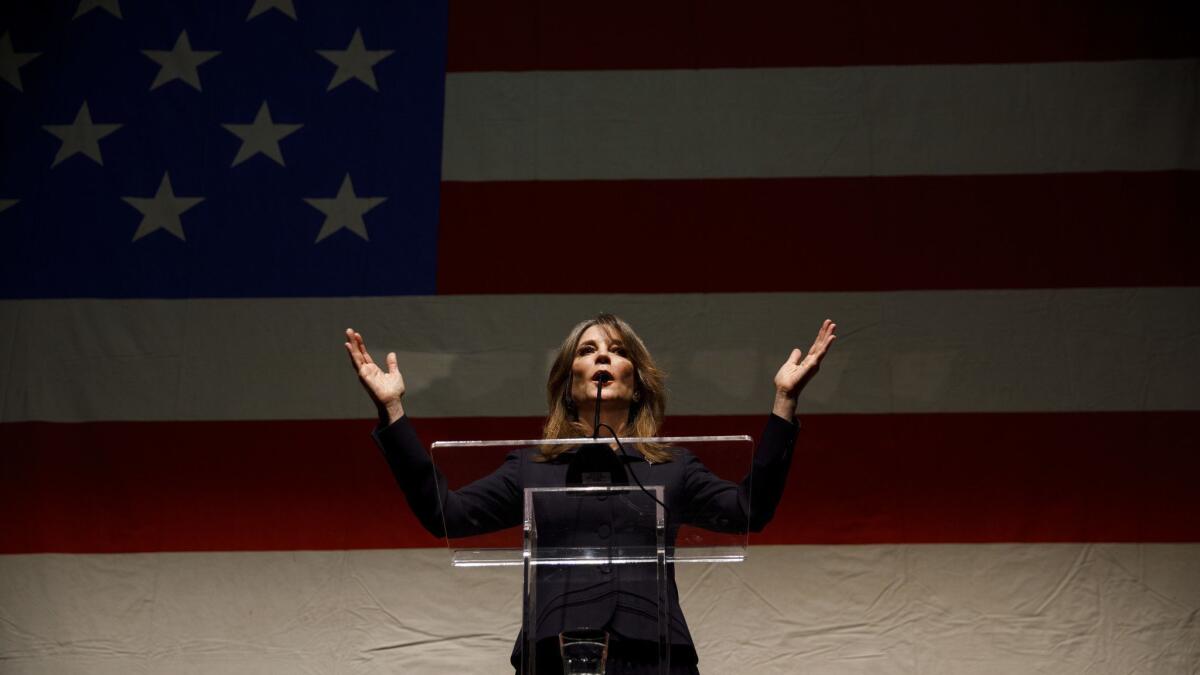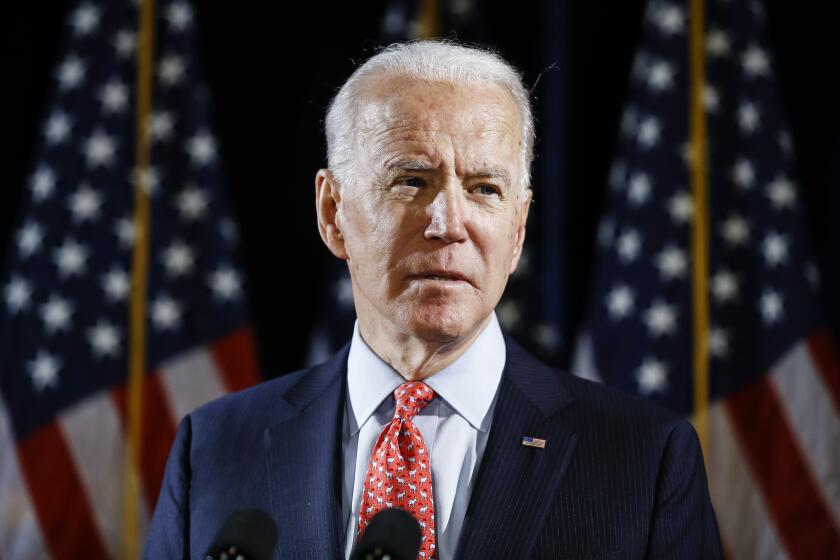Self-help author Marianne Williamson exits 2020 presidential race

- Share via
Self-help author Marianne Williamson, a Democratic presidential candidate known for her unpolished talking points and message of harnessing love to take on President Trump, has dropped out, becoming the 14th Democratic candidate to leave the 2020 race.
Williamson, who failed to qualify for the last four debates, announced she was ending her campaign in a statement Friday on her website.
For the record:
4:49 p.m. Jan. 10, 2020A previous version of this article said Williamson challenged then-Democratic incumbent Henry Waxman in a 2014 congressional race. She set out to challenge him, but soon after he announced he would retire, and she became part of the large field running to succeed him.
“We will not be able to garner enough votes in the election to elevate our conversation any more than it is now,” she wrote. “The primaries might be tightly contested among the top contenders, and I don’t want to get in the way of a progressive candidate winning any of them.”
Williamson has never held political office and didn’t give canned talking points or typical campaign stump speeches. Instead, she elevated her background as a spiritual leader and offered unusual solutions to the nation’s ills in passionate — some would argue bizarre — oratory. Along with putting out traditional policy proposals on issues such as healthcare, immigration and gun control, Williamson proposed creating a Department of Peace to create a federal platform that will “seriously wage peace domestically,” according to her website.
About five months into her campaign, Williamson was forced to issue an apology. At a New Hampshire event in June, Williamson described vaccine mandates as “draconian” and “Orwellian,” according to a tweet from a campaign reporter.
Williamson, when asked for comment, said that she misspoke and that she agrees vaccines save lives.
Some of her standout moments came on the national debate stage. And when she failed to qualify for the third Democratic debate, Williamson held her own gathering in Beverly Hills. Standing in front of a lectern at the Writers Guild of America, she spoke about the climate crisis, beating Trump in 2020 and investing more in “cultivating” peace. Her post-debate commentary was broadcast to her fans.
She raised just over $6.1 million in the first three quarters of 2019, outpacing some more established candidates who are members of Congress, according to the Federal Election Commission.
Williamson’s performances at the first two Democratic debates at times left viewers transfixed. At the July debate in Detroit, she called out the “wonkiness” of the event and the “dark psychic force of the collectivized hatred” that she said Trump was inciting. She spoke frankly about the water crisis in nearby Flint, Mich., and systemic racism and environmental injustice in the U.S.
“Flint is just the tip of the iceberg,” she said. “If you think any of this wonkiness is going to deal with this dark psychic force of the collectivized hatred that this president is bringing up in this country, then I’m afraid that the Democrats are going to see some very dark days. We need to say it like it is. It’s bigger than Flint. It’s all over this country. It’s particularly people of color, it’s particularly people who do not have the money to fight back, and if the Democrats don’t start saying it, then why would those people feel that they’re there for us?”
At that same event, a moderator asked Williamson why she was qualified to make the case for $500 billion in financial assistance to descendants of slavery.
“Well, first of all, it’s not $500 billion in ‘financial assistance,’ it’s $500 billion — $200- to $500-billion payment of a debt that is owed. That is what reparations is,” the candidate said, prompting applause from the crowd. “We need to recognize that when it comes to the economic gap between blacks and whites in America, it does come from a great injustice that has never been dealt with. That great injustice has had to do with the fact that there were 250 years of slavery followed by another 100 years of domestic terrorism.”
According to an analysis by FiveThirtyEight, Williamson became the most-searched candidate after the debate, but the more voters learned about her, the less they liked her. As her name recognition went up, her net favorability fell.
The severity of her campaign’s struggles became apparent last week when she announced she couldn’t afford “a traditional campaign staff” and laid off her team. She initially insisted she still intended to compete and had events scheduled in Iowa, the first state to vote in the primary contest.
The field is down to Joe Biden now that Bernie Sanders ended his presidential campaign. Here is the Democrat heading for a battle with President Trump.
Williamson launched her campaign in January 2019 at the Saban Theatre in Beverly Hills, and many in attendance were fans of her self-help books and ministry. She spoke for 40 minutes without notes, relying on 35 years of experience as a public speaker.
Williamson ran unsuccessfully for the 33rd Congressional District seat in California in 2014 among a wide field looking to succeed Democrat Henry Waxman. She was mostly known for her expertise in self-help (she’s written more than a dozen books) and her friendship with Oprah Winfrey, who bought 1,000 copies of Williamson’s 1992 book, “A Return to Love,” and said she experienced “157 miracles” after reading it. The year before, Williamson had officiated Elizabeth Taylor’s wedding to Larry Fortensky at Michael Jackson’s Neverland Ranch.
In her statement Friday suspending her campaign, she said she would support whichever Democrat wins the nomination: “I will be there with all my energy and in full support.
“Finally, these are not times to despair; they are simply times to rise up,” she concluded. “Things are changing swiftly and dramatically in this country, and I have faith that something is awakening among us. A politics of conscience is still yet possible. And yes….love will prevail.”
More to Read
Get the L.A. Times Politics newsletter
Deeply reported insights into legislation, politics and policy from Sacramento, Washington and beyond. In your inbox twice per week.
You may occasionally receive promotional content from the Los Angeles Times.












